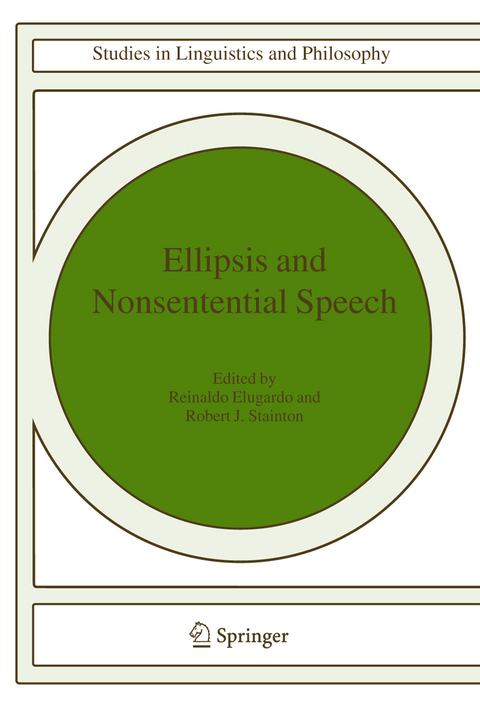
Ellipsis and Nonsentential Speech
Seiten
2005
|
2005 ed.
Springer-Verlag New York Inc.
978-1-4020-2299-9 (ISBN)
Springer-Verlag New York Inc.
978-1-4020-2299-9 (ISBN)
The papers in this volume address two main topics: Q1: What is the nature, and especially the scope, of ellipsis in natural l- guage? Q2: What are the linguistic/philosophical implications of what one takes the nature/scope of ellipsis to be? As will emerge below, each of these main topics includes a large sub-part that deals speci?cally with nonsentential speech. Within the ?rst main topic, Q1, there arises the sub-issueofwhethernonsententialspeechfallswithinthescopeofellipsisornot;within the second main topic, Q2, there arises the sub-issue of what linguistic/philosophical implications follow, if nonsentential speech does/does not count as ellipsis. I. THE NATURE AND SCOPE OF ELLIPSIS A. General Issue: How Many Natural Kinds? There are many things to which the label ‘ellipsis’ can be readily applied. But it’s quite unclear whether all of them belong in a single natural kind. To explain, consider a view, assumed in Stainton (2000), Stainton (2004a), and elsewhere. It is the view that there are fundamentally (at least) three very different things that readily get called ‘ellipsis’, each belonging to a distinct kind. First, there is the very broad phenomenon of a speaker omitting information which the hearer is expected to make use of in interpreting an utterance. Included therein, possibly as a special case, is the use of an abbreviated form of speech, when one could have used a more explicit expression. (See Neale (2000) and Sellars (1954) for more on this idea.
The Nature and Scope of Ellipsis.- Against Reconstruction in Ellipsis.- The Semantics of Nominal Exclamatives.- Nonsententials in Minimalism.- A Note on Alleged Cases of Nonsentential Assertion.- On the Interpretation and Performance of Non-Sentential Assertions.- Non-Sentences, Implicature, and Success in Communication.- The Link between Sentences and ‘Assertion’: An Evolutionary Accident?.- Implications.- Knowledge by Acquaintance and Meaning in Isolation.- Co-Extensive Theories and Unembedded Definite Descriptions.- The Ellipsis Account of Fiction-Talk.- Quinean Interpretation and Anti-Vernacularism.- Saying What You Mean: Unarticulated Constituents and Communication.
| Erscheint lt. Verlag | 10.5.2005 |
|---|---|
| Reihe/Serie | Studies in Linguistics and Philosophy ; 81 |
| Zusatzinfo | VII, 266 p. |
| Verlagsort | New York, NY |
| Sprache | englisch |
| Maße | 156 x 232 mm |
| Themenwelt | Geisteswissenschaften ► Philosophie ► Sprachphilosophie |
| Geisteswissenschaften ► Sprach- / Literaturwissenschaft ► Sprachwissenschaft | |
| Informatik ► Theorie / Studium ► Künstliche Intelligenz / Robotik | |
| Sozialwissenschaften | |
| ISBN-10 | 1-4020-2299-9 / 1402022999 |
| ISBN-13 | 978-1-4020-2299-9 / 9781402022999 |
| Zustand | Neuware |
| Haben Sie eine Frage zum Produkt? |
Mehr entdecken
aus dem Bereich
aus dem Bereich
Buch | Softcover (2024)
REDLINE (Verlag)
20,00 €
Eine kurze Geschichte der Informationsnetzwerke von der Steinzeit bis …
Buch | Hardcover (2024)
Penguin (Verlag)
28,00 €


